- Home
- Regan Walker
The Holly and the Thistle Page 2
The Holly and the Thistle Read online
Page 2
“He is known to my good friends Lord and Lady Ormond. I believe Mr. Stephen—his name is William Stephen, by the by—and Ormond attended Cambridge together, which suggests he’s in his mid-thirties. Just the right age and still nearly ten years your senior. He’s never been married, apparently too consumed with his family’s shipbuilding enterprise in northeast Scotland to take care of the matter. But his father wants him wed, or so Ormond tells me, and Mr. Stephen has conveniently purchased a townhouse in London. Though I daresay his father would prefer he wed a Scottish gel, you came immediately to mind.”
“You said he was unusual?”
“He’s the heir to Stephen and Sons, recognized by the Crown for the ships they provided for the war against that horrible Frenchman.”
“Napoleon,” Emily supplied.
“Quite.”
Emily groaned and downed the rest of her Madeira. It was going to be a long evening.
* * *
By the time the guests began to arrive en masse, Emily had consumed another glass. She stood in the large parlour talking with Mary, Lady Ormond, a blonde beauty of an age with her and already the mother of two boys. She was married to the tall, handsome Marquess of Ormond who never seemed to leave her side, although just now, as Emily looked around, he was nowhere to be seen.
“Where is Lord Ormond?” she asked, noting his absence.
“Gone to inquire about some champagne, I suspect, and perhaps snagged on his way back by one of his cohorts.” Lady Ormond cast a glance about the room. “The countess seems to have outdone herself tonight. It’s not even Christmas and the greenery is abundant.”
“She tells me it’s her first Christmas in Town in a very long time and she’s determined to celebrate early. Tonight’s dinner is but the start of her revelry.”
“I do so love Christmastide, don’t you?” Lady Ormond’s green eyes looked wistful and almost blue, reflecting her sapphire gown.
“Yes, I enjoy this time of year and seeing the children’s eyes light up at all the decorations. This morning when I was out, I saw several with their noses pressed to a shop window. Having your two young ones must make this time special.”
“Henry and Philip bring a real joy to my husband and me, especially at this time of year. I was the only child of my parents, and Ormond lost his only brother in an accident while he was still a child, so our little family is very precious to us.”
Before Emily could say more, Lord Ormond joined them. He was accompanied by a footman bearing a tray of champagne. The marquess handed a glass to his wife and one to Emily. “Good evening, Lady Picton,” he said. “Quite a fete is it not?”
The room had swelled with late arriving guests and the noise level rose as tongues loosened in response to the sparkling wine. Music of the season had begun in one corner, and a hundred candles glittered overhead in the three chandeliers.
“Yes, it is.” Emily loved Christmastide, and any chance to begin the holiday early was welcome.
“Ah, there you are,” said the countess from behind her.
Emily turned. Rising above the countess’s feather was the brawny clerk from Berry’s. What was he doing here?
“Countess,” said Ormond, bowing, “a delightful soirée.”
The clerk from Berry’s smiled at Ormond then eased past the countess to shake his hand. “Ormond,” he said.
“Stephen,” the marquess replied enthusiastically.
Stephen? The Scot the countess wanted her to meet?
“Lady Picton,” said Muriel, “allow me to present to you Mr. William Stephen.”
The man she’d only known as a wine clerk faced her and executed a perfect bow accompanied by a dashing smile. He was dressed like the marquess, all in black save his waistcoat, shirt and cravat, which were ivory. His wavy chestnut hair and deep brown eyes were arresting. He was, as she’d noted in Berry’s, quite handsome. In her fit of pique she’d dismissed those good looks. Now that she observed him a second time, there was something overwhelmingly appealing about the man. Despite herself, she felt an unwanted attraction.
“Mr. Stephen,” the countess said, facing the Scot. “Lady Picton. I believe you already know Lord and Lady Ormond.”
“Lady Picton,” said Mr. Stephen, a bemused expression on his face.
“Come, you two,” said the countess, addressing the Ormonds. “I have something for you to see.”
The three bade them good eve and departed, leaving Emily alone with the oversized Scotsman, who was apparently not a clerk at all, but a successful shipbuilder. She wasn’t certain at the moment which was better.
* * *
William couldn’t believe his eyes. The charwoman he’d encountered in Berry’s, bedraggled and sodden, was Sir Thomas Picton’s young widow he’d heard so much about.
He would never have recognized the woman he’d encountered that afternoon save for her expressive eyes that matched her light purple gown. No wonder she had suitors standing in line! Ormond had told him she’d rejected them all. When he’d first heard that tidbit, his interest had been piqued. Marriage had not been his goal, but he did love a good chase. In this race, he had not thought to win, only to place. But now, seeing this beautiful, poised woman before him, he wondered if that were still true. Beneath that strength was a fragility, a tenderness he ached to nurture.
Stealing a glance at her full breasts and the heather-colored stone dangling from the pearls just above them, William realized he hadn’t been wrong about her figure when he’d seen it wrapped in that wet cloak. The black hair that previously tangled around her face, hiding her delicate features, was now confined into shinny curls at her nape.
“Why didn’t you introduce yourself this afternoon?” she asked accusingly. “You allowed me to believe you were one of Berry’s clerks! You…you imposter!”
The sparks flying from those lavender eyes rendered her quite alluring.
“At the time it didn’t seem important. Then, too, you were”—he chuckled, remembering her earlier appearance—“in disguise, if you’ll recall. I had no idea you were a lady. The clerk was in the cellar locating a bottle of cognac for me. You looked like you needed help.”
It appeared his words only further annoyed her, so he tried to rectify his error. “I only recognize you now by your beautiful eyes, leannan.”
The word, spoken in Gaelic, had not been intended. But once spoken, the endearment seemed to fit. For some reason he couldn’t explain, he wanted to use the word for this woman. It was more than her beauty, more than her spirit. Perhaps it was…fate?
Just then the butler announced dinner was served, and the other guests advanced into the great hall where the longest dining table he’d ever seen was set with crystal and gilded china. Holly and evergreen were artfully arranged around the long row of tall candelabra standing like soldiers down the center of the table.
“May I escort you to your seat?” William asked as he offered Lady Picton his arm.
Blushing but still looking annoyed, she placed her gloved hand on his sleeve. He vowed to overcome her displeasure. He would be calling her Emily by the end of the evening…at which point he also he intended to kiss her.
Mistletoe. Now there was a holiday tradition upon which Scots and the English could agree.
* * *
Emily should have known the Scotsman would be seated next to her. Another suitor she would have to discourage. It had become a sort of game between herself and Muriel. The countess proffered candidates, and Emily sent them away.
The Ormonds sat across from her, and on her right was the blond Mr. Griffen Lambeth, the younger son of the Earl of Lindsey, and his red-headed wife Elizabeth, a very kind woman Emily had met the year before.
“How is your little girl, Mrs. Lambeth?” Emily asked.
“Oh, little Alice is a jewel. Very sweet.”
“I’m thinking of matching her to Ormond’s oldest boy, Henry,” Elizabeth’s husband said.
“Alice is only eighteen months old,” remarked Eli
zabeth. “A bit early, don’t you think, dear?”
Across the table, Ormond chimed in. “Never can plan too early, especially when it comes to Lambeth’s young redheaded babe.”
It was a conspiracy, Emily decided. The matchmakers were busy at work, even pairing up children. She turned to the Scot whom she’d been ignoring, though that had been difficult with his huge shoulders touching hers. The man was tall, lean and well-muscled, given the fit of his clothes. Not a man who was easily forgotten.
“So, are you leaving for Scotland soon, Mr. Stephen?”
He chuckled, as if he knew she was hoping he might. “No, I’ll be here for the holidays. I have a townhouse in London now, and at least a few times a year I must be here for my business interests.” He focused brandy-colored eyes on her and grinned. “Perhaps we can spend some time together.”
“Perhaps,” she allowed as she focused on her soup. Not a chance. She’d make herself scarce as a ghost, and then he could return to his ships and the frozen north.
The countess’s menu was an early Christmas feast, with succulent roast pork and glazed roast turkey with stuffing, accompanied by sautéed mushrooms and Brussels sprouts in sauce. Emily assumed Muriel was saving the roast goose for Christmas dinner.
The wine served with the meal put Emily in a merry mood notwithstanding the Scotsman. She even had to admit that she actually enjoyed listening to him tell Ormond about his schooners and the shipbuilding factory he’d opened in Arbroath on the North Sea coast. It sounded so far away. Perhaps she would not see him much after all. Now, why was that not a welcome thought? Too much wine must be making her melancholy.
“Will you miss being in Scotland for Christmas?” she asked him casually.
He faced her. For a moment they stared at each other, unable to break the connection. “You must recall, my lady, that Christmas has not been celebrated as a holiday in Scotland for over two hundred years, not since the straitlaced Kirk proclaimed Christmas a Popish feast and as such needed banning. We celebrate Hogmanay, the New Year.”
“I’m so sorry. What a shame not to be able to celebrate Christmas.”
“Well, we celebrate in private. And Ormond and my time at Cambridge taught me the joy of the season. Then, too, I’m celebrating it with you now, Lady Picton.”
Emily smiled. “Yes, you are.” What else could she say?
Dessert was mince pie, which by tradition was eaten the twelve days before Christmas for good luck in the coming year, so she’d been expecting it. But her favorite was Christmas plum pudding, and she was delighted to see the countess had included it in the menu. It was a mixture of thirteen ingredients, to represent Christ and the twelve apostles: suet, brown sugar, raisins, currants, citron, lemon and orange peels, spices, crumbs, flour, eggs, milk and brandy. An amazing concoction that, once boiled in a pudding cloth, filled the air with one of the wonderful scents of the season.
Trying to avoid the Scotsman’s intense eyes, Emily concentrated on her pudding. It was only when the ladies retired to the parlour, leaving the men to their port and conversation, that she breathed a sigh of relief. The man was formidable, and she made a mental note to not drink more than a glass of wine in his presence in the future.
An hour later, the men rejoined the ladies and the countess announced they would play snapdragon, a favorite game of the holiday. Apparently the Scotsman was not familiar with it, for he wore a puzzled look.
Seeing his expression, the countess asked Griffen Lambeth to explain.
“First a bowl is filled with brandy,” said Lambeth, with a knowing look. “Then we drop into it raisins and almonds. Once that is accomplished, we light the liquor and extinguish all the candles. While in the dark room, with only the blue flame to guide us, we must try and pick out the fruit and nuts while not getting burned.”
Lambeth smiled, seemingly in anticipation. Perhaps he was good at the game. Emily had played it before. The brandy did not burn at a very high temperature, though it was still possible to get one’s fingers scorched and she had done so at least once. If one were fast, however, one accumulated more raisins and nuts than the others—and a better prize. But after the day she’d had, fighting other fingers for fruits and nuts in the midst of flames didn’t appeal.
* * *
The game they were about to play seemed silly, but William embraced it—especially when he considered he’d be standing next to the beautiful Lady Picton in the dark. He hadn’t missed that she’d now consumed several glasses of wine. Would she notice if his arm slipped daringly about her waist? That seemed a long step toward his goal of kissing her by the end of the night, which made him think of the prize.
“What goes to the one who collects the most fruits and nuts?” he asked.
“Why, I think the one who accumulates the most should be able to name his own boon, Countess,” Ormond offered. “What say you?”
“A boon within reason is most fitting,” agreed their hostess. “Play on!”
A boon? Well then, William intended to win.
The room was soon in darkness, and the players gathered around the table upon which sat the bowl of blue flame. William immediately began to pick out the raisins and nuts. Many hands grabbed for the nuts and pieces of fruit, and there were several exclamations of alarm when fingers lingered too long in the flames. Years of working around ships had hardened his fingers and palms sufficiently that he was quite indifferent to the heat of the liquor, however, and in the end William had his victory.
“Name your boon,” said the countess as the other players congratulated him.
“A kiss under the mistletoe from Lady Picton.”
Gasps could be heard around the room, as well as a few hearty guffaws.
“Well said,” offered Ormond, with a pat on William’s shoulder.
“I suppose we should have asked what your boon would be before the game was played,” said Lady Picton, appearing at his side. Though she’d not played the game, he was pleased to discern she was a good sport and would not deny him his reward.
“Do not worry, Lady Picton,” he promised. “I’ll collect later.”
An hour passed and the guests played a different game. Blind Man’s Bluff, it was called. Soon after that, however, they began to leave. William waited until all but Lady Picton had departed.
“Allow me to see you to your carriage, my lady?”
“And to the bough hanging over the entry hall, I daresay,” offered the countess, looking amused. “I’ll bid you both good night here in the parlour. We are all to have Christmas dinner at the Ormonds’, do not forget. I trust you will be in attendance, Mr. Stephen?”
“Yes, and I look forward to it.” But what he really looked forward to was seeing Lady Picton again. Perhaps he could even manage that earlier than Christmas.
In the entry hall, under the mistletoe, William waved the butler off and took Emily into his arms. “Leannan,” he whispered as his lips brushed hers. They were soft and inviting.
She pulled away after a moment, as if a brush of the lips was all he intended.
“Not quite,” he whispered, and he pressed his lips to hers again, this time deepening the kiss, taking her mouth gently but thoroughly. His tongue swept briefly into her sweet-tasting warmth, and the taste of her sent his head spinning.
Lady Picton pressed her hands to his chest, breaking away. “Enough!”
Her violet eyes were glazed, her lips swollen. She looked dazed, but not displeased. The proper widow was fighting herself as much as him, and he wanted more than kisses.
“Will you let me take you for a ride in my carriage tomorrow?” he asked. “Or, perhaps we could go wine shopping?” He couldn’t help the grin that spread across his face at the jest.
She stepped back and gave him a defiant look. “I think not, sir.”
He liked her spirit, but it would not be enough. Lady Picton had no idea how persistent he could be. If he could build a shipyard out of nothing, he could surely capture the heart of this heather-eyed lass
. “We shall see, Emily. Leannan.”
* * *
“Some more holly on the mantel I should think,” Emily suggested to her footman as she stood back admiring the Christmas greenery of holly, ivy, hawthorn and rosemary. The chandelier above was decorated with greenery and red velvet bows. “And perhaps a few more candles.”
It was Christmas Eve, and she’d finished her errands of the day. She had no events to attend until tomorrow and was looking forward to an evening at home. Being an only child whose parents were no longer living, she spent the season with her friends, but she had never resisted the quiet evenings when she could read.
The footman added another layer of holly on the mantelpiece above the roaring fire and three more white candles. The sweet fragrant smell of wassail that had been steaming all afternoon filled the room, and Emily inhaled deeply, happy that Christmastide was finally here.
Her butler Harrison entered the parlour and waited for her to acknowledge him.
“Yes?”
“My lady, a gentleman caller has arrived—a Mr. Stephen.” Harrison extended a small silver tray bearing a card.
The Scotsman. While she had not seen him, she had thought of him many times over the last several days. Unlike the dowager countess’s other offerings, the men of the ton she’d so quickly dismissed as suitors, the brawny shipbuilder with the intense brandy-colored eyes had left a memory that would not desert her. His kiss. Her cheeks flamed as she recalled the way he’d held her imprisoned in his arms. It was no foppish peck he’d given her but a ravishing of her mouth she still remembered.
Well, there was nothing for it; she’d have to see him. The countess had asked her to be nice to him. And it was Christmas.
“Show him in, Harrison.”
A moment later the Scotsman’s broad shoulders appeared in the doorway. The man was larger than life, and Emily was caught off guard when her heart leapt at his sudden appearance. She drank in his handsome face.
“Happy Christmas to you, Mr. Stephen.”
“Lady Picton,” he said with a bow. “A happy Christmas to you as well. Is that wonderful smell what you English call wassail? I remember it from my days at Cambridge and a few Christmases spent with Ormond. Mulled cider and spices…”

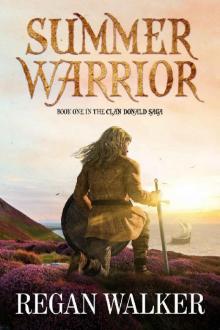 Summer Warrior (The Clan Donald Saga Book 1)
Summer Warrior (The Clan Donald Saga Book 1)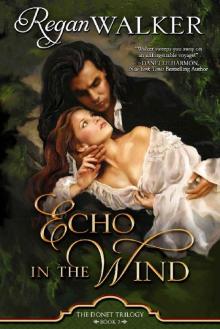 Echo in the Wind
Echo in the Wind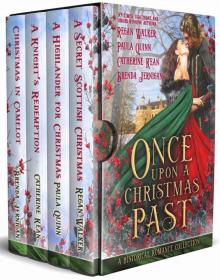 Once Upon a Christmas Past
Once Upon a Christmas Past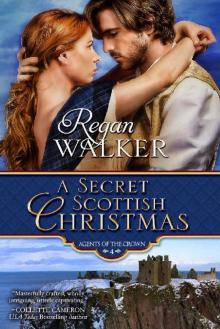 A Secret Scottish Christmas (Agents of the Crown Book 4)
A Secret Scottish Christmas (Agents of the Crown Book 4)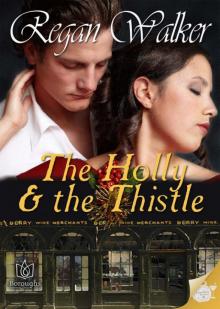 The Holly and the Thistle
The Holly and the Thistle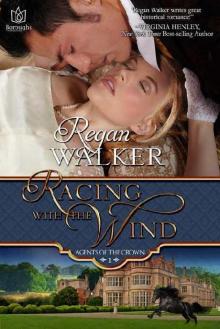 Racing with the Wind (Agents of the Crown)
Racing with the Wind (Agents of the Crown)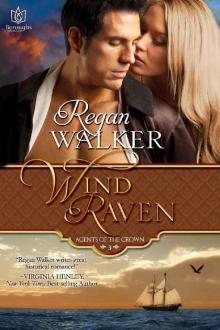 Wind Raven (Agents of the Crown)
Wind Raven (Agents of the Crown)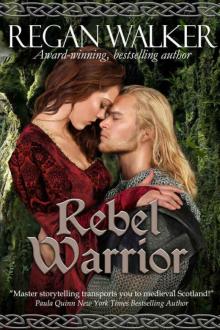 Rebel Warrior (Medieval Warriors #3)
Rebel Warrior (Medieval Warriors #3)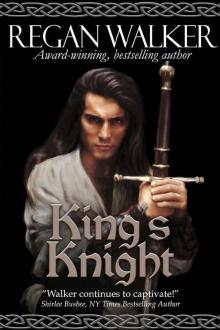 King's Knight (Medieval Warriors Book 4)
King's Knight (Medieval Warriors Book 4)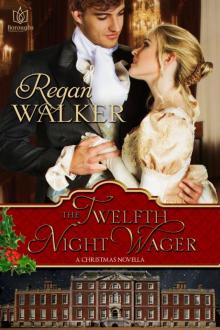 The Twelfth Night Wager
The Twelfth Night Wager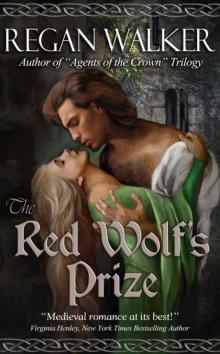 The Red Wolf's Prize
The Red Wolf's Prize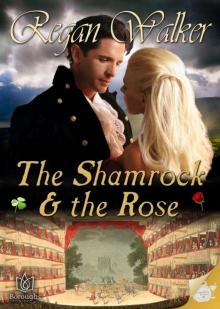 The Shamrock & the Rose
The Shamrock & the Rose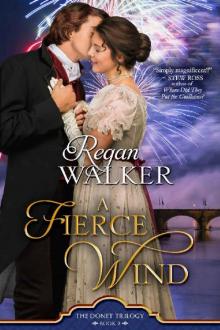 A Fierce Wind (Donet Trilogy Book 3)
A Fierce Wind (Donet Trilogy Book 3)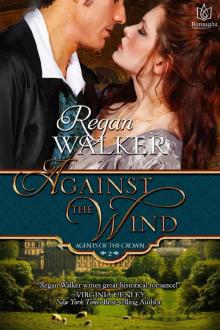 Against the Wind (Agents of the Crown Book 2)
Against the Wind (Agents of the Crown Book 2)